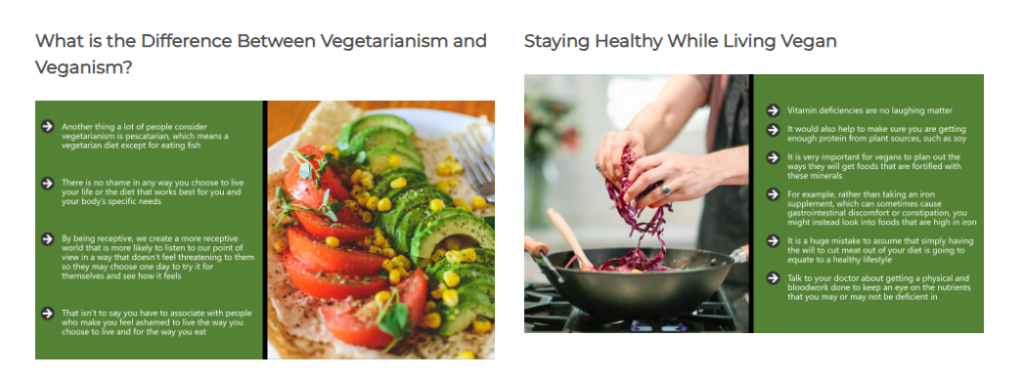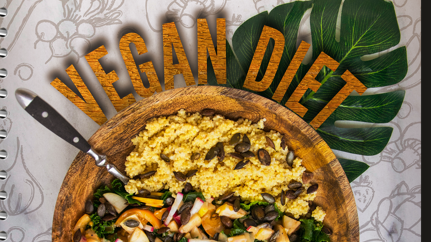Veganism: More Than Just a Diet
Veganism represents a holistic lifestyle choice that extends far beyond dietary preferences. At its core, veganism is defined by the principle of minimizing harm to animals, promoting ethical treatment, and opting for plant-based alternatives. Many individuals who transition to this lifestyle often cite ethical motivations, such as animal rights and welfare, as driving forces behind their choice. The decision to adopt veganism frequently stems from a deepened understanding of the implications surrounding animal agriculture and the desire to contribute to a more humane society.


In addition to ethical considerations, environmental factors play a pivotal role in the vegan lifestyle. The production of plant-based foods generally has a lower carbon footprint compared to the meat and dairy industries. Advocates argue that by adopting a vegan diet, individuals can significantly reduce their environmental impact, combating climate change and preserving ecosystems. The growing awareness of how animal agriculture contributes to deforestation, water scarcity, and pollution has prompted many to embrace this lifestyle as a proactive solution.
Health motivations also significantly influence the shift toward veganism. A plant-based diet is associated with numerous health benefits, including lower risks of heart disease, diabetes, and obesity. Many individuals have reported improvements in their overall well-being after eliminating animal products from their diets, leading to increased energy levels, better digestion, and clearer skin. This health transformation often sparks a broader reevaluation of food choices and consumption patterns, encouraging individuals to prioritize whole foods and nutrient-dense options.
Personal journeys through veganism can be diverse and transformative. Many people share stories of how this lifestyle has reshaped their relationship with food, prompting them to explore new culinary avenues and develop a deeper appreciation for natural ingredients. Overall, veganism is not merely a dietary restriction; it represents a comprehensive shift in ethical beliefs, environmental responsibility, and health consciousness, urging individuals to reconsider their roles within a global consumption framework.
The Privilege of a Vegan Lifestyle: Resources and Accessibility
The transition to a vegan lifestyle has become increasingly accessible over the years, thanks in large part to the abundance of resources available to those interested in adopting this diet. Grocery stores and supermarkets now typically stock a variety of vegan products, ranging from plant-based meat alternatives to dairy-free options. This growing availability reflects a broader societal shift towards plant-based eating, which, while beneficial for many, also highlights the privilege that comes with having access to these foods.

Community support plays an essential role in facilitating this transition. Online platforms, local meet-ups, and social media groups provide spaces for individuals to share recipes, tips, and experiences related to veganism. Many cities also host vegan festivals and markets, which serve as excellent venues for engagement, education, and the exploration of various vegan products. Such gatherings strengthen community bonds and help make the transition smoother for those contemplating a vegan diet.
However, it is critical to acknowledge the socioeconomic factors that can create barriers to adopting a vegan lifestyle. Low-income communities may have limited access to grocery stores that offer a comprehensive selection of vegan foods, often driving residents to rely on cheaper, less nutritious options. Furthermore, the perception that veganism is an expensive lifestyle can deter individuals from exploring plant-based eating. This calls for action to ensure that healthy, accessible food options are available to all, regardless of economic status.

To advocate for broader access to vegan resources, it is essential to engage with local policymakers and support initiatives that promote equitable food distribution. Additionally, fostering partnerships with community organizations can facilitate awareness and education surrounding affordable vegan options. By addressing these disparities, we can work towards a future where the privilege of a vegan lifestyle is accessible to all individuals. In conclusion, enhancing resource accessibility not only supports individual choices but also promotes collective health and sustainability.
Practical Steps to Transition: A Guide to Going Vegan
Transitioning to a vegan diet can be an enriching and transformative journey. To begin, it is essential to educate yourself about the principles of veganism and understand the motivations behind this lifestyle choice, such as ethical, health, or environmental factors. This foundational knowledge will help maintain your commitment as you navigate the changes ahead.
Meal planning is a critical step in making a successful transition to a vegan diet. Start by creating a weekly menu that features a variety of plant-based meals. Incorporate foods from different food groups including grains, legumes, fruits, and vegetables to ensure nutritional balance. This not only simplifies grocery shopping but also minimizes food waste, as you will have a clear idea of what you need. A well-structured meal plan can alleviate the feeling of being overwhelmed by the array of options available.


When grocery shopping, focus on replacing non-vegan staples with plant-based alternatives. Common replacements include almond or soy milk for cow’s milk, tofu or tempeh in place of meat, and nutritional yeast to replicate cheesy flavors. Many supermarkets now carry vegan-friendly products, providing numerous options for cheese, yogurt, and even meat substitutes. Read labels carefully to identify hidden animal products in processed foods, such as gelatine or casein.
Cooking without animal products might seem daunting at first, but numerous resources are available to help you. Consider trying vegan cookbooks or online recipe websites, which offer a wealth of innovative ideas and inspiration. Experimenting with herbs, spices, and various cooking methods can also enhance flavors in plant-based dishes. As you explore the diverse world of vegan cuisine, you will discover that the possibilities are almost limitless.
Moreover, nutrient intake is paramount for a balanced vegan diet. Pay particular attention to essential nutrients such as protein, iron, calcium, vitamin B12, and omega-3 fatty acids. Understanding where to find these nutrients in plant-based foods can help you maintain your health throughout the transition. Regularly consulting a healthcare professional or a nutritionist may also provide valuable guidance, ensuring that all aspects of your diet are well-rounded and nutritious.
Becoming an Expert: Utilizing Multimedia Resources for a Cruelty-Free Diet

In the pursuit of mastering a vegan lifestyle, engaging with a diverse range of multimedia resources can significantly enrich one’s journey. Various platforms offer a wealth of information and creativity that greatly contribute to understanding the complexities of veganism. Notably, informative videos and documentaries serve as visual aids that can inspire and educate. For instance, popular platforms like YouTube feature channels dedicated to vegan cooking, nutrition, and ethical living, showcasing practical tips and innovative recipes that facilitate the adoption of a cruelty-free diet.
Documentaries such as “Forks Over Knives” and “What the Health” present compelling arguments for veganism, addressing health benefits and environmental concerns associated with animal agriculture. These films are not only educational but also emotionally engaging, encouraging viewers to reflect on their dietary choices and promoting a deeper understanding of the implications of consuming animal products.
Podcasts also represent a dynamic avenue for learning and exploring vegan topics on-the-go. Programs like “The Rich Roll Podcast” and “Food for Thought” feature interviews with renowned activists, nutritionists, and chefs, discussing various aspects of veganism including recipes, ethical considerations, and personal experiences. This audio format allows listeners to immerse themselves in vegan culture while multitasking, making it accessible for individuals with busy lifestyles.

Moreover, the internet hosts a multitude of vegan blogs that not only offer comprehensive recipes but also delve into the philosophical and ethical dimensions of veganism. Blogs such as “Minimalist Baker” and “Oh She Glows” provide resources ranging from beginner-friendly recipes to deep dives into sustainable living practices. Following these platforms fosters a sense of community and continuous learning.
By utilizing these multimedia resources, individuals can gain a well-rounded understanding of veganism, ultimately enhancing their commitment to living a cruelty-free lifestyle. The integration of diverse formats encourages deeper engagement, reinforcing the notion that becoming an expert in veganism is an evolving journey fueled by knowledge and inspiration.



Pingback: Is Benefits of # Liv Pure Dietary Supplement USA? - uniaffinity.com